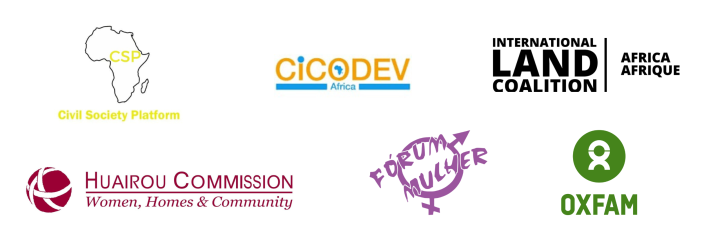In a world grappling with the relentless challenges of climate change, global hunger, and widening inequalities, the urgent need to secure women's land rights has never been more apparent. As the World Bank Land Conference 2024 draws near, the Civil Society Platform for Engaging with the African Union (CSP) is set to convene an important session titled "Enhancing the Role of Civil Society Platform in Africa: Implementation of the Land Policy in Africa." This roundtable aims to advance change by amplifying grassroots voices, sharing expertise, and proposing concrete solutions to advance land rights across the continent.
The CSP's work builds upon a ground-breaking moment in African land governance. Just over a decade ago, African leaders united under the African Union (AU) to adopt the "Declaration on Land Issues and Challenges" in Africa. Along with the Declaration, other important policy instruments and guidelines such as the Framework and Guidelines on Land Policy in Africa (F&G), were adopted – laying the foundation for the AU Agenda on Land. The Land Policy Initiative (LPI), now the African Land Policy Centre (ALPC), was established, marking a concerted effort to advance this agenda, involving a range of stakeholders ranging from national governments, Regional Economic Communities, and non-government organisations (NGOs).
The CSP's work is more relevant in these times with Africa, grappling with multiple crises, from the COVID-19 pandemic to increasing pressures on land and resources as highlighted in Oxfam's recent policy paper on women's land rights.
Inequalities persist despite the commendable progress in land policy development driven by the AU Agenda on Land. While 19 countries have now adopted national land policies, up from just 4 or 5 in 2006, as highlighted by the recent assessment by CSP the gender gap in land rights is still enormous; women who are the backbone of agricultural production in many African communities, continue to face challenges, and now worsened by land acquisitions, privatisation of communal lands, and false climate solutions disproportionately affecting women.
Civil society's perspective, rooted in the lived realities of communities, is indispensable in bridging the gap between policy commitments and ground-level change. The CSP session at the World Bank conference on Land and Poverty amplifies the voices of CSOs and grassroots leaders bridging both the micro and macro-level barriers faced by women and men hindering progress on land rights. From challenging at patriarchal norms, discriminatory inheritance laws, and decision-making spaces, to funding challenges and threats posed by large-scale land acquisitions and the privatisation of communal lands.
As the World Bank conference approaches, policymakers and stakeholders must heed civil society's clarion call for action. The CSP's recommendations, echoed in the study on the Land Policy in Africa, highlight the progress and what needs to be done to strengthen land rights of African women and men first and foremost. It is important that stakeholders:
- Elevate women's voices in land governance;
- Support grassroots movements;
- Fund civil society organisations and community-based organisations (CBOs) working in grassroots areas;
- Adopt intersectional approaches.
Governments must lead the charge by implementing gender-responsive land policies, enforcing legal reforms, and allocating resources to close the gap between commitments and reality. Donors and the private sector must support initiatives that promote women's land rights and holding stakeholders accountable. The international community must rally behind this cause, recognising it as a lynchpin for achieving sustainable development and climate resilience.
The CSP session at the World Bank Land Conference 2024 represents a crucial moment for Africa CSOs fighting for land rights. For many their existence is depending on these efforts; 'land is their life'. It is time for policymakers to take concrete steps in protecting and strengthening land rights, centring the expertise of civil society, and providing long-term funding for their land programs.
Through enhancing the role of civil society in Africa in the Land Policy implementation, real transformation will be birthed. Opening up space for CSOs to share their expertise, based on their day-to-day experience, funding their work, including resources to enable them to participate in policy spaces such as this conference is crucial.
While the journey ahead may be arduous, collective will and action can build a future where every African man and woman can claim their rightful place on the land they call home. Policymakers and funders must act now to transform land rights and create a just and equitable world for all. The time for action is now – let us seize this moment and build a brighter future together.
